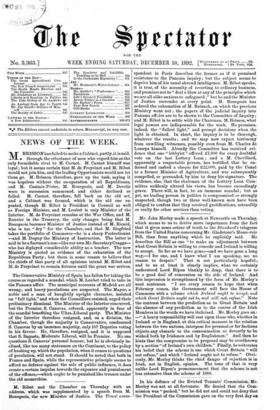Mr. John Morley made a speech at Newcastle on Thursday,
which seems to us to derive more importance from the fact that it gives some colour of truth to the Standard's telegram from the United States concerning Mr. Gladstone's Home-rule Bill, than from anything which he explicitly said. He describes the Bill as one " to make an adjustment between what Great Britain is willing to concede and Ireland is willing to accept. So far as we have gone,—and we have gone a long way,—I for one, and I know what I am speaking, see no reason to despair." That is not particularly hopeful ; and to us at least it clearly implies, what we certainly understood Lord Ripon blankly to deny, that there is to be a good deal of concession on the side of Ireland. And this impression is strengthened by the form of Mr. Morley's next sentences. " I see every reason to hope that when February comes, the Government will face the House of Commons with a scheme which Ireland ought to accept, and which Great Britain ought not to, and will not, refuse." Note the contrast between the prediction as to Great Britain and the absence of any prediction as to the course of the Irish Members in the words we have italicised. Mr. Morley goes on : —"A heavy responsibility will rest upon those who, whether in Ireland or in England, at this critical moment in the relation between the two nations, interpose for personal or for factious objects any obstacle to the consummation so devoutly to be wished both by Irishmen and by Englishmen." And then he hints that the compromise to be proposed may be overthrown by a section " of Ireland's own children." Finally, he reiterates his belief that the scheme is one which Great Britain " will not refuse," and which "Ireland ought not to refuse." Obvi- ously, Mr. Morley thinks the chief danger of rejection is in Irish, not in English, opinion. The tone of that is very unlike Lord Ripon's pronouncement that the scheme is not less extensive than the scheme of 1886.






































